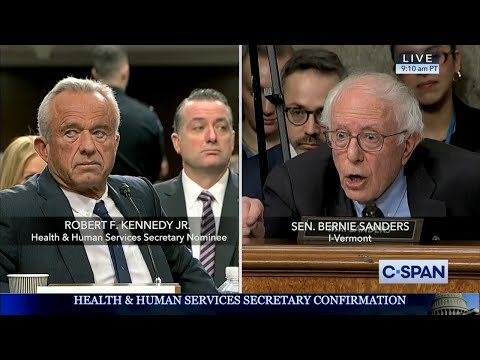**Navigating the Health Care Debate: A Clarity or Confusion?**
Recently, a rather heated discussion took place at a Senate hearing about health care in America, featuring a spirited exchange between Senator Sanders and the newly appointed Health and Human Services Secretary, Mr. Kenedy. The phrase “Make America Healthy Again” might just have been the slogan of the day, drawing attention to a system that many argue is more focused on profits than providing care for Americans. With a staggering 85 million people uninsured or underinsured, Senator Sanders wasted no time in illustrating the immense challenge facing the nation’s health care system.
Senator Sanders painted a grim picture of the situation: Americans are spending two to three times more on health care than citizens in other countries, yet millions are left without adequate coverage. It was a call to action that couldn’t be ignored, especially when comparisons were made to the wealthiest Americans, who enjoy significantly longer life expectancies. The Senator asserted that something has to change, as many working-class citizens are live six or seven years shorter lives than the top 1%. This disparity has become a matter of urgency, and Senator Sanders isn’t one to shy away from addressing it head-on.
Mr. Kenedy, however, seemed to dance around the core question posed by the senator: Is health care a human right? His answer suggested that it’s a bit more complicated than that. Unlike the inherent right to free speech, health care may involve more variables, prompting a discussion about personal responsibility and the potential burden on the system. This conversation highlights the rustiness of agreeing on where health care fits in the list of human rights. With a large number of citizens left in the lurch, one can’t help but wonder if the lack of consensus is preventing necessary reform.
Of course, they couldn’t ignore the elephant in the room — the drug companies. Senator Sanders pointed out that these corporations are raking in astronomical profits, while patients in the U.S. are forced to pay significantly more for medications than in other countries. Mr. Kenedy appeared to agree that reforms are needed, showcasing a rare moment of unity in a divided room. It’s clear that the price disparities in prescription drugs are becoming hard to swallow for a public that’s already facing mounting health care costs, and the potential solutions could involve taking a much closer look at the practices of pharmaceutical companies.
As the conversation turned toward other controversial issues like climate change and vaccines, it continued to reflect the polarized views that often characterize political discussions. Mr. Kenedy’s insistence on maintaining a pro-vaccine stance, while simultaneously having founded an organization that sold contradictory merchandise, left many scratching their heads. If politics were a game of chess, this exchange resembled a rather confusing match where the moves made by both players left the audience wondering just who was winning.
In conclusion, the Senate hearing served as a microcosm of the larger health care debate in America. With passionate voices on both sides and citizens caught in the crossfire, it brought to light crucial issues that need addressing. Whether it’s acknowledging health care as a human right, tackling monopolistic drug pricing, or ensuring consistent messaging on public health, the road ahead is clear: America needs to address its health care crisis with urgency, clarity, and a united front to truly make the nation healthy again.



